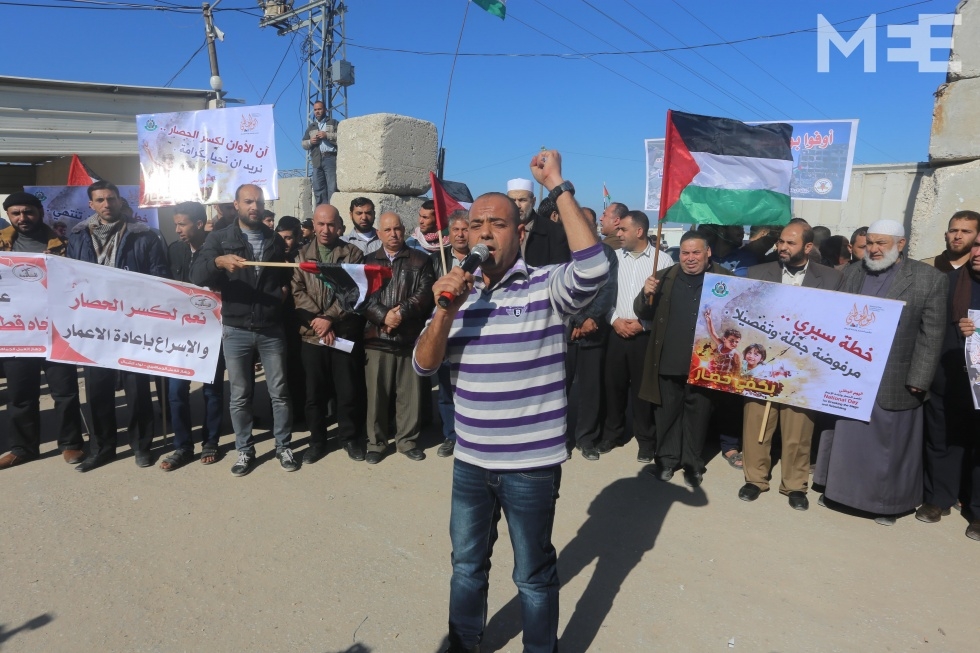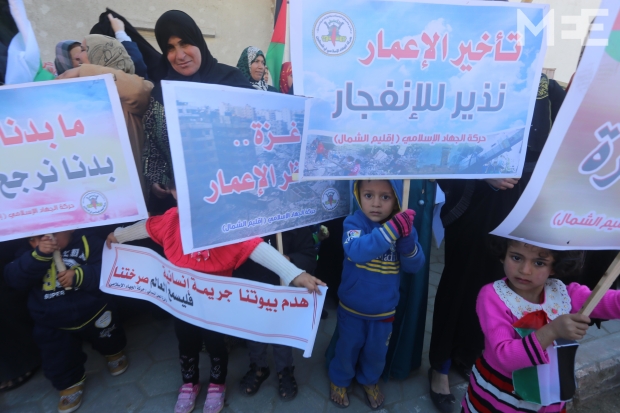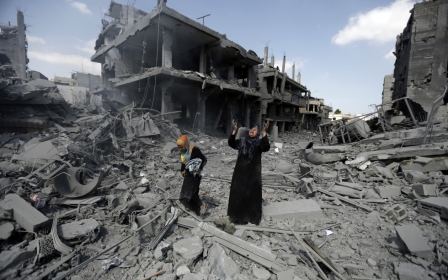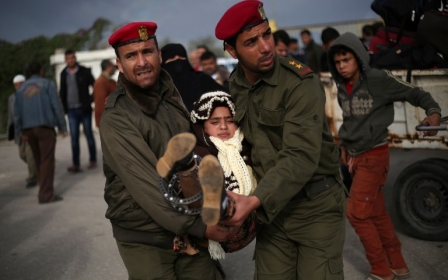Gazans take to streets demanding end of blockade

Gaza City - Massive public demonstrations were held on Sunday across the Gaza Strip demanding an immediate end to the blockade and an acceleration of reconstruction of the costal enclave following Israel's onslaught over the summer.
"We don't want to rent apartments, we want homes of our own," said an angry woman who had lost her home in Shejaiyah in July during Israel's 51-day assault, which forced her and her seven children to live with relatives.
The demonstrations set out from five different points across the Gaza Strip, later converging on Saladin Street which connects the southern end of the strip in Rafah with the north in Beit Hanoun.
Palestinian national and Islamic coalition parties called for today's demonstrations as a national day for breaking the blockade and for Gaza reconstruction.
The protesters called on Palestinian President Mahmoud Abbas to come to Gaza and quickly begin assessing what has been destroyed over the summer and translating the multi-billion dollar pledges of reconstruction aid at the Cairo donors' conference in October into action on the ground.
The protests reflects growing anger at the lack of progress on fulfilling pledges of assistance from the international community.
In Shejaiyah, east of Gaza City, hundreds of people gathered to block the main road. Hamas leader Ismail Radwan told the crowd that there are few options - either end the siege and begin the reconstruction of Gaza or face an "explosion."
He told crowds that the continuation of the Gaza blockade and closure of crossings was a crime against humanity.
"On behalf of the national and Islamic parties in Gaza Strip, we declare that we will not recognise Israel, and we will stick to our guns and will not commit to deals signed with the (Israeli) occupation."
Radwan insisted that Palestinian national reconciliation was a necessity.
He called on President Abbas to go to the International Criminal Court to lodge a complaint against Israeli leaders for war crimes that they had committed in Gaza over the summer.
Over the past few months, several protests have called on the Egyptian government to open the Rafah crossing, Gaza's only crossing with Egypt.
Meanwhile Saleh Nasser, senior leader of the Democratic Front for the Liberation of Palestine, said Israel is responsible for any outcome that could result from the current situation in Gaza.
He called on donors to stick to their pledges and transfer funds for Gaza construction as soon as possible. "It is important that the United Nations ends the blockade to facilitate building Gaza swiftly,"
Nasser said, "The UN is both legally and morally accountable for ending the blockade and the reconstruction of Gaza."
Popular Front for the Liberation of Palestine spokesman Jamil Mezher expressed a common criticism among Palestinian factions of the UN mechanism for Gaza construction, which was agreed by UN special co-ordinator Robert Serry, the PA and Israel, and gives Israel a veto over building projects and supplies going into Gaza.
"Serry's plan came to cool down the situation and does not offer a definite solution for Palestinian people on whom injustice has been inflicted."
Mezher added that the continuation of the Serry mechanism would delay reconstruction of Gaza and increase the suffering of the Palestinian people.
"For Palestinians, the ultimate solution is to cancel Serry's plan and replace it with a Palestinian national consensus government plan to rebuild Gaza," Mezher said.
However, for this to happen, both Fatah and Hamas will have to implement the reconciliation deal signed in April between the two groups.
The mass demonstrations come amid a worsening humanitarian situation in Gaza. The Gaza Electricity Distribution Corporation (GEDC) announced on Sunday morning that electricity would be cut off for 12 hours at a time and come back on for six hours during each 24-hour cycle.
"Over the summer, we died by missiles, but now we die slowly with lack of electricity, lack of cooking gas, lack of reconciliation and restricted movement," said Abu-Baker, a 62-year-old man living in Shejaiyah who had lost his home in the summer offensive.
Power plant officials have said that the Ramallah-based Palestinian National Authority is demanding the payment of the so-called blue tax on fuel going into Gaza.
Since the conflict, Qatar has provided funds to pay the blue tax, but now the funding has expired making fuel unaffordable for the GEDC.
New MEE newsletter: Jerusalem Dispatch
Sign up to get the latest insights and analysis on Israel-Palestine, alongside Turkey Unpacked and other MEE newsletters
Middle East Eye delivers independent and unrivalled coverage and analysis of the Middle East, North Africa and beyond. To learn more about republishing this content and the associated fees, please fill out this form. More about MEE can be found here.





